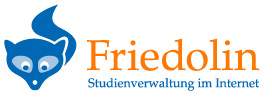| Name des Moduls | [117610] Quantum Computing | Bezeichnung des Moduls | PAFMO261 |
| Studiengang | [128] - Physik | ECTS Punkte | 4 |
| Arbeitsaufwand für Selbststudium | 75 | Häufigkeit des Angebotes (Modulturnus) | jedes 2. Semester (ab Sommersemester) |
| Arbeitsaufwand in Präsenzstunden | 45 | Dauer des Moduls | 1 |
| Arbeitsaufwand Summe (Workload) | 120 | ||
| Modul-Verantwortliche/r | Dr. F. Steinlechner, Dr. F. Eilenberger, Prof. Dr. T. Pertsch |
| Voraussetzung für die Vergabe von Leistungspunkten (Prüfungsform) | written examination (100%) |
| Empfohlene Literatur | A list of literature and materials will be provided at the beginning of the semester. |
| Unterrichtssprache | English |
| Art des Moduls (Pflicht-, Wahlpflicht- oder Wahlmodul) | 128 M.Sc. Physics focus „specialisation”: Required elective module 628 M.Sc. Photonics: Required elective module 528 M.Sc. Quantum Science and Technology, required elective module, subject area “specialization” |
| Zusammensetzung des Moduls / Lehrformen (V, Ü, S, Praktikum, …) | Lecture: 2 h per week Exercise: 1 h per week |
| Inhalte | • Basic introduction to algorithms and computing • The Qubit and entanglement thereof • Basics of quantum algorithms • Advanced quantum algorithms • Implementation of QuBits and quantum computers • Hands-on circuits |
| Lern- und Qualifikationsziele | After active participation in the course, the students will be familiar with the basic concepts of quantum computation and the implementation of quantum algorithms. They will be able to apply their knowledge in the assessment and creation of quantum algorithms and the development of quantum information systems. The intended learning outcome is to introduce the students to the basic usage of quantum bits for information processing. To provide further insight, the course will expand this concept on multipartite systems and introduce the concept of entanglement. In a further step we shall see how individual quantum operations tie together to create algorithms. Important algorithms, such as the quantum Fourier transformation, the algorithms of Shor and Grover will be discussed. To relate the abstract knowledge on quantum algorithms to practical applications, real-world implementations of quantum computers will be discussed. |


